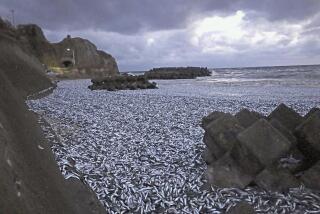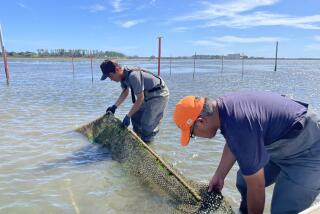Japan’s fishermen protest fuel prices
- Share via
OTARU, JAPAN — Shigeru Honma had not been to Tokyo in more than 30 years. But on July 1, the 58-year-old fisherman from this port city in northern Japan dusted off an old suit and traveled to the capital to deliver a letter to the prime minister.
Soaring fuel prices are killing Japan’s fishing industry, it said. Give us money, or oil.
There’s been no response from the prime minister’s office, so fishery cooperatives have organized a nationwide strike today with 200,000 vessels halting operations. About 3,600 fishermen and supporters are to protest in Tokyo.
“We are very gentle, but it’s time to say something now,” said Honma, a third-generation fisherman.
Spiraling fuel and food costs have sparked riots and protests in many countries. In Japan, where demonstrations are relatively rare, the rising prices are threatening a way of life in this seafood-loving nation.
“If we lose our fishing industry, we Japanese will face a food crisis,” said Masahiko Ariji, a fishery specialist at the Amita Institute for Sustainable Economics in Kyoto. About two-thirds of the nation’s fishing groups were in the red last year, he said. With fuel prices higher this year, some “are about to collapse.”
The price of gas at Japan’s pumps has jumped to about $6.40 a gallon from $4.35 in the spring. Taxi and transit companies have bumped up rates, as have airlines. Though prices of tuna, squid and other seafood have risen, fishing companies say they can’t easily pass on costs to customers because of competition from imports.
Whether Japan’s government will help is not known.
“Right now, we haven’t decided on any concrete measures,” said Takuro Nakamura, at the Ministry of Agriculture, Forestry and Fisheries.
About 230,000 people work in Japan’s fishing industry. But lately, fewer boats have been heading out to sea. Fishing company officials say some have quit the business because they can’t pay for oil, fishing crews, ice and other supplies and make a profit. Oil now accounts for 25% to 40% of overall expenses, they say. It costs about $3.95 a gallon for the heavy oil used for fishing boats, double from a year ago.
Among the hardest hit are squid-fishing vessels, which burn additional oil to run lamps to lure the mollusks at night and drive them into nets. Last month, about 3,000 squid-fishing boats stopped work for two days to protest fuel prices.
Takeei Sato, chairman of Otaru’s Vessel Fishing Assn., said nobody, even the fishermen’s children, wanted to join the industry.
If fuel prices keep rising, as many as 20% of Japan’s fishing companies will close and 85,000 fishermen could leave the industry, the National Federation of Fisheries Cooperative Assns said. The fish catch, it says, could fall by almost half.
That has wholesalers and diners worried. Masa-Zushi, a highly regarded sushi restaurant in Otaru, is procuring raw fish from all over the world and tweaking menus to deal with a supply and price crunch.
The last time fishermen demonstrated in Tokyo was about a dozen years ago, to complain about South Korean boats in Japan’s waters. It took three years to resolve the issue.
“This time we can’t wait that long,” said Yasuo Ito, president of a fishing operation here. “The fish will be gone.”
--
Researchers Naoko Nishiwaki and Hisako Ueno of The Times’ Tokyo Bureau contributed to this report.
More to Read
Sign up for Essential California
The most important California stories and recommendations in your inbox every morning.
You may occasionally receive promotional content from the Los Angeles Times.











